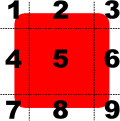BorderImageMesh QML Type
Defines a mesh with vertices arranged like those of a BorderImage. More...
| Import Statement: | import QtQuick 2.15 |
| Since: | Qt 5.8 |
Properties
- border
- border.bottom : int
- border.left : int
- border.right : int
- border.top : int
- horizontalTileMode : enumeration
- size : size
- verticalTileMode : enumeration
Detailed Description
BorderImageMesh provides BorderImage-like capabilities to a ShaderEffect without the need for a potentially costly ShaderEffectSource.
The following are functionally equivalent:
BorderImage {
id: borderImage
border {
left: 10
right: 10
top: 10
bottom: 10
}
source: "myImage.png"
visible: false
}
ShaderEffectSource {
id: effectSource
sourceItem: borderImage
visible: false
}
ShaderEffect {
property var source: effectSource
...
}
Image {
id: image
source: "myImage.png"
visible: false
}
ShaderEffect {
property var source: image
mesh: BorderImageMesh {
border {
left: 10
right: 10
top: 10
bottom: 10
}
size: image.sourceSize
}
...
}
But the BorderImageMesh version can typically be better optimized.
Property Documentation
This property describes how to repeat or stretch the middle parts of an image.
- BorderImage.Stretch - Scales the image to fit to the available area.
- BorderImage.Repeat - Tile the image until there is no more space. May crop the last image.
- BorderImage.Round - Like Repeat, but scales the images down to ensure that the last image is not cropped.
The default tile mode for each property is BorderImage.Stretch.
The 4 border lines (2 horizontal and 2 vertical) break the image into 9 sections, as shown below:

Each border line (left, right, top, and bottom) specifies an offset in pixels from the respective edge of the mesh. By default, each border line has a value of 0.
For example, the following definition sets the bottom line 10 pixels up from the bottom of the mesh:
BorderImageMesh { border.bottom: 10 // ... }
The base size of the mesh. This generally corresponds to the sourceSize of the image being used by the ShaderEffect.